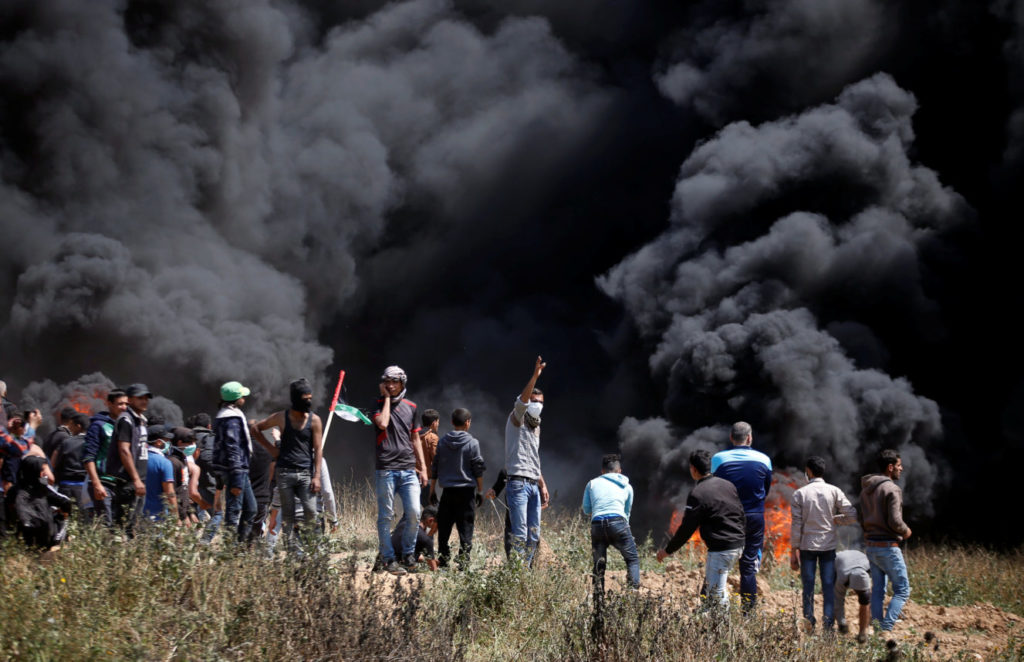
The press should consider its role carefully
Many news outlets juxtaposed the recent opening of the US embassy in Jerusalem with grim images of injured Gazans, suggesting that while the right-wing elite was having a jamboree in the holy city, the Israeli military massacred innocent protesters. This interpretation of the events, as it later turned out, was a gross misrepresentation: Much of those killed in those days were Hamas or Islamic Jihad operatives, and the “demonstrations” were more akin to riots, with Palestinians destroying infrastructure vital to their already hard-pressed home. The current phase saw an escalation to rocket attacks from the strip, including against a kindergarten, to which the Israeli military rightfully responded.
One often overlooked feature of such distorted press treatment – in addition to a blatant professional failure, of course – is how it fuels antisemitism against the Jewish diaspora.
We know that during times of tension in the Levant, Jews can face increased hostility. This was certainly the case in America in 2014, and the UK experienced a similar spike. In Scotland specifically, the Scottish Council of Jewish Communities (SCoJeC) reported that the country’s Jewish population felt increasingly pressurised during and in the aftermath of the 2014 Gaza war.
A 2017 report by the Campaign Against Antisemitism found that 81% of British Jews agreed that media bias against Israel fuels persecution of Jews in Britain. Recalling the firebombing of a French synagogue, Eylon Levy opined in The Guardian around the 2014 conflict that “one answer” for what “encourages outbursts of anger” against diaspora Jews is “that the media attention [to Israel] has been excessive, exaggerated beyond all reasonable proportions.”
This appears a sensible explanation, and the numbers do not confute it. After all, the Israeli-Palestinian conflict is a confusing one, and the public relies on the media to process events and present a narrative. An escalation can thus form a so-called trigger event, and misreporting then serves to increase tensions for the Jewish diaspora. The Community Security Trust, British Jewry’s security organisation, concurs.
For its part, a good chunk of Scottish and British media picked up the aforementioned false narrative (e.g. the BBC, Herald Scotland, STV, or Common Space), treating the Israeli case with more than a healthy hint of scepticism and, sometimes, with outright hostility. The Church of Scotland, ever the interloper, said that the “killing of civilians is a matter of international concern”.

Even some segments of British Jewry were misled in the clicking frenzy. The Jewish Chronicle’s Daniel Sugarman, for example, wrote an intimate piece criticising the IDF’s use of force at the Gaza border, only to recant it a few days later.
“I had fallen into the trap I had always been convinced I would not fall into. I had condemned Israel for defending itself,” he wrote.
In London’s Parliament Square, over 50 young Jews recited kaddish – a Jewish mourning prayer – for Gazans killed, only to have progressive Jewish movements distance themselves from them soon after. Leah Jordan, who led the prayer and was student chaplain for Liberal Judaism at the time, was confirmed to be leaving her position after the fiasco, though the Liberal movement insisted that the timing was pure coincidence.
All of this suggests that misinformation may not only increase antisemitism for diaspora Jews, but it sows discord within its communities, too. Because 93% of British Jews consider Israel to be a big part of their identities, it would be wise for news outlets to treat the Israeli-Palestinian conflict with the same amount of professionalism they devote to other issues.
It is not suggested that coverage of Israel should gloss over anything. Kid gloves are not needed. But in our increasingly cacophonous internet age, it is important that the press consider its role carefully. When covering any topic, they may use outrage culture to drive traffic, risking the inaccuracy of “hot takes” and the alienation of entire communities. Or they can strive to a less profitable, but infinitely more responsible, levelheadedness. The choice is theirs.
Contributed by Strathclyde University CAMERA Fellow Marcell Horvath

